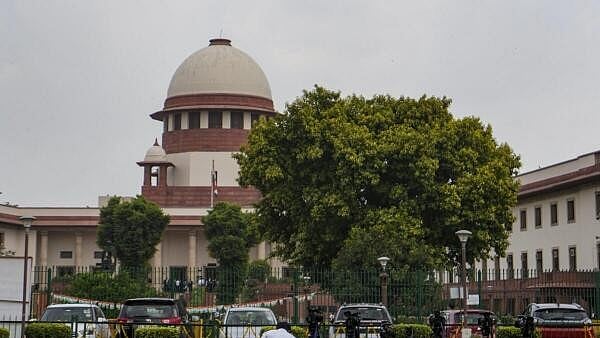
The Supreme Court in New Delhi
Credit: PTI Photo
New Delhi: The Supreme Court on Wednesday flagged a growing trend in the top court in which verdicts pronounced by judges, are being overturned by succeeding benches or specially constituted benches at the behest of some party aggrieved by the verdicts prior in point of time.
"The object of Article 141 of the Constitution seems to be this: the pronouncement of a verdict by a bench on a particular issue of law (arising out of the facts involved) should settle the controversy, being final, and has to be followed by all courts as law declared by the Supreme Court,'' a bench of Justices Dipankar Datta and Augustine George Masih said.
However, if a verdict is allowed to be reopened because a later different view appears to be better, the very purpose of enacting Article 141 would stand defeated, the court added.
"The prospect of opening up a further round of challenge before a succeeding bench, hoping that a change in composition (of judges) will yield a different outcome, would undermine this court’s authority and the value of its pronouncement,'' the bench said.
The bench emphasised a matter that is res integra may not be reopened or revisited or else consistency in legal interpretation could be compromised and the special authority that is invested in decisions of this court, under Article 141, lost.
"The weight and influence of that special authority depend on the credibility we, the judges, give to it. As judges of this court, we are alive to the position that overturning a prior verdict by a later verdict does not necessarily mean that justice is better served,'' the bench said.
The court rejected a plea by Sk Md Anisur Rahman to modify his bail conditions to allow him to visit his home town, Purba Medinipur, West Bengal. He faced trial for killing his political rival on October 7, 2019.
By an order on January 3, 2025, a bench of Justices Abhay S Oka (since retired) and Masih granted him bail with the condition that he would remain confined to the city of Kolkata. His previous application for modification of the bail condition was dismissed on May 5, 2025.
In his fresh plea, it was contended such a condition was an unreasonable restriction on his right to liberty protected by Article 21 of the Constitution.
The court, however, noted the de-facto complainant resiled from his stand and almost 10 police witnesses turned hostile apart from other witnesses and the State also gave a direction for withdrawal of prosecution, which was ultimately set aside, ''leaving a very bitter taste in the mouth''.
"The very purpose of the order granting bail, in this case, would stand frustrated if the condition requiring Anisur not to leave Kolkata was modified,'' the bench said.
The court opined, if any modification of the condition is made now and thereby the stringency relaxed, that would not only amount to overstepping the order of this court granting bail but would send a wrong message of this court being unconcerned with the principle of finality of judicial decisions.
The bench also noted that Anisur has been provided security cover by none other than the Superintendent of the Police force of the district of which he is a permanent resident. If indeed there is any threat perception that endangers Anisur’s life in Purba Medinipur, it would be appropriate for him not to leave Kolkata till such time the trial is concluded, the court said.
